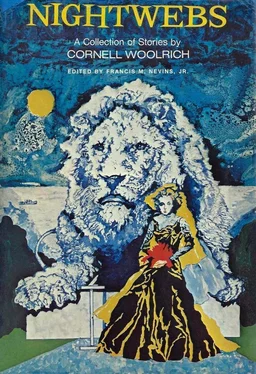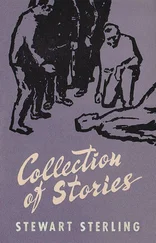And so the sad, last years wore on. Woolrich had become a diabetic and an alcoholic, he was obsessed with the fear that he was homosexual, he had lost touch with most of the few acquaintances he had ever had. His fellow writers Michael Avallone and Robert L. Fish, his editors Frederic Dannay and Hans Stefan Santesson, one academic (Prof. Donald A. Yates of Michigan State), and a few business people; no others. He had never believed in God; he had ached all his life to believe in love but nothing had worked right for him; now he no longer believed even in himself. He would sometimes come to a party, bringing his own bottle of cheap wine in a paper bag, and would stand alone in a corner the whole evening. Someone would be introduced to him, and would tell him how much he admired Woolrich’s work, and Woolrich would growl, “You don’t mean that,” and find himself another corner. A tiny rivulet of new stories appeared every so often in EQMM or Saint Mystery Magazine , each eagerly awaited and discussed by those who loved his work, none equal in power to those great novels and stories of the Thirties and Forties, most of them full of agony, bitterness, and self-contempt.
In 1965 two more collections of his short fiction were published. The Ten Faces of Cornell Woolrich , edited by Ellery Queen, was of high quality, but seven of its ten stories came straight out of earlier collections. The Dark Side of Love brought together eight stories from the author’s last period, including three, unsaleable to magazines, that appeared for the first time in the collection itself. The hypnotic power of his own self-disgust and his longing for just a little love permeate these stories and make them hard to forget, objectively poor though most of them are. And there are two good stories in the book: “The Clean Fight,” a sloppy but nightmarish evocation of the NYPD as Gestapo, and “Too Nice a Day to Die,” a bitter ironic little gem on the randomness and gross injustice we call the world.
There were no more books published in his lifetime and less than half-a-dozen further stories, and his condition continued to deteriorate. He developed gangrene in his leg and did nothing about it; when the doctors reached it, it was too far gone to do anything but amputate. He must have thought he was going to die, for he told the story of his life to the hospital chaplain and said that he wanted to return to the Catholic faith in which he had been baptized. Whether this was a true conversion or a reflex of fright is not clear; those who knew him best do not seem to remember any change in his beliefs after he left the hospital. In any case, he remained in lonely isolation, confined in a wheelchair, unable to learn how to walk on an artificial leg, probably unable to write anything. [5] Details of the books left unfinished at Woolrich’s death are given in the afterword to the last story in this volume and in Section II of the Bibliography.
He died of a stroke a few months later, on September 25, 1968, leaving no survivors. His estate of close to a million dollars he left in a trust fund to Columbia University, for scholarships to go to students of creative writing. The fund is named after his mother.
Why is Woolrich not only one of the greatest suspense writers in the history of crime fiction but also a literary artist that some people think the equal of Poe? Perhaps we can begin to suggest answers to these questions by sketching the forces at the heart of Woolrich’s world.
Ideally, at the end of a detective novel of the formal-deductive-problem type, all the intellectual perplexity that we have experienced as the plot developed has been dissolved, every fragment of the story has been given its raison d’être, and we can step back and view the entire array of fragments as a rationally harmonious mosaic. Likewise, at the end of an orthodox suspense novel all the howling panic we have experienced while reading has been dissolved, the demons have been scattered and the world is again without abysses. Akira Kurosawa in his great film Rashomon (1950) reversed the convention of the formal problem, telling a murder story and then showing that no rational explanation is possible. This is exactly what Woolrich had done several times, beginning at least a dozen years before Kurosawa’s film, and reversing the convention not only of the detective story but also, and even more characteristically, of the suspense story. Woolrichian suspense stories typically end not with the dissolution of terror but with its omnipresence. For Woolrich’s world is controlled by powers that delight in destroying us. They are not reachable by human goodness, their ways are not our ways, and against them we are helpless.
The nature of the god of Woolrich’s world is the subject of many of his stories. In Night Has a Thousand Eyes (1945) we see that nature directly in all its power and hideous malignancy; more often, however, we see it only as reflected in the nature of the universe itself — chaotic, irrational, abandoned to the demonic, as in “I Wouldn’t Be in Your Shoes” and I Married a Dead Man . A graphic portrait of the Woolrichian god is sketched in “The Light in the Window” (Mystery Book Magazine, 4/46), in which a mentally disturbed soldier returns from World War II to his home city. While standing in the darkness across the street from his girl’s apartment, wondering how to tell her he is home, he is brought up against a barrage of circumstantial evidence whose inevitable cumulative effect in his mind is an overpowering conviction that she has been sleeping with another man. In a scene faintly suggestive of Othello, he strangles the girl, then walks out of her apartment as if in a trance. Almost at once his shellshock returns, and the night streets are transformed for him into a battleground. He tries to dig a foxhole in the sidewalk with bare and bloody hands. He mistakes a solicitous passerby for a lieutenant and salutes him. Finally taken to a hospital, he comes out little more than a vegetable, with nothing left but the wait for the merciful release of death. “You had to wait for it, what else could you do? It was an order, from a lieutenant. A different one, you never saw. But He’d given it just the same; you had to obey.” Now both the soldier and the reader learn that the girl had been faithful, that the cumulative evidence had all been “coincidence,” and that the janitor of the girl’s apartment building has just been executed for her murder. Less than half a page later we re-enter the soldier’s thoughts: “You just had to be patient and wait, that was all. You couldn’t question a lieutenant.” In view of what Woolrich has shown us, it would not be unreasonable to conclude that once again no lieutenant is present — that, in short, the only god is chance — except for the inescapable fact that the pattern of events is so utterly dependent on multiple coincidence that something more than coincidence must underlie the events. Where the pattern is so complex and so directed to a single end, it cannot be attributed to chance: the old watchmaker argument, but used here to infer a god we would be much happier without. And the only possible response of the god’s victims is that of Helen in I Married a Dead Man : “We’ve lost. That’s all I know. We’ve lost, we’ve lost.”
The workaday naturalistic world is no more comforting in Woolrich’s vision than the powers beyond, for the dominant reality in that world is the Depression. There is very little either in or out of the crime genre that can match Woolrich’s evocations of a frightened little guy in a seedy apartment, with a hungry wife and children, no money, no job, and desperation eating him like a cancer. One can learn more about the anguish of the Thirties from “Dusk to Dawn” and “Borrowed Crime” and “Goodbye, New York” and other Woolrich stories than from volumes of social history. And yet these stories are not primarily naturalistic reportage; the Depression functions for Woolrich not so much as brute social fact but rather as a part of his own malignant universe.
Читать дальше












